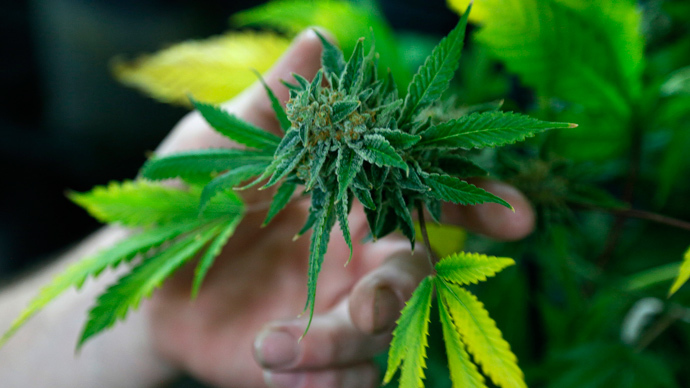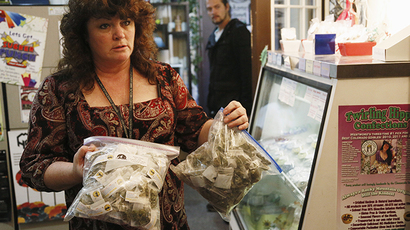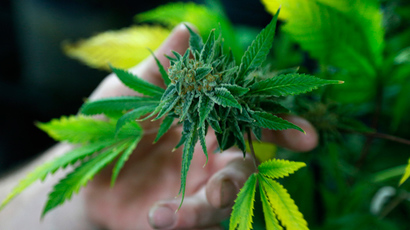DEA admits marijuana legalization 'scares us'

A top official at the US Drug Enforcement Administration has said that legalizing marijuana, a drug that a majority of Americans are now in favor of decriminalizing, is “reckless and irresponsible.”
James L. Capra, the chief of operations at the DEA, was responding to a question from a senator Wednesday when he admitted authorities are nervous about the prospect of legalization measures, which are becoming more popular throughout the US after decriminalization initiatives passed in Colorado and Washington.
“I have to say this…going down the path to legalization in this country is reckless and irresponsible,” he said. “I’m talking about the long term impact of legalization in the United States. It scares us.”
Cannabis remains illegal under federal law, which trumps conflicting state law. Yet US President Obama has said his administration will not enforce federal marijuana restrictions in states where it has been decriminalized.
Were that not the case, the DEA would be responsible for cracking down on pot shops. The agency, in fact, has sustained heavy criticism because it continues to harass grow operations in California, Montana, and elsewhere where the drug is now legal for medicinal purposes.
Sales in Colorado began on January 1 and will begin in Washington within the coming months.
“There are more dispensaries in Denver than there are Starbucks,” Capra said, as quoted by the Washington Post. “The idea somehow people in our country have that this is somehow good for us as a nation is wrong. It’s a bad thing.”
An October Gallup poll found that more Americans than ever admitted they are in favor of legalizing marijuana. The number, which stands at 58 percent, has slowly increased in the decades since Gallup first asked the question in 1969, when a mere 12 percent were in favor of legalization.
Along with Colorado and Washington, 21 states have laws protecting medical marijuana for citizens with serious illnesses. Yet even more are poised to join the fray, with lawmakers in California, New York, and elsewhere suggesting in recent weeks that pot will become more accessible in their state in some form within the next 12 months. A Washington Post poll compiled this week found that Washington DC residents favor decriminalization by a 2:1 ratio.
Yet Capra made it clear on Wednesday that he remains unconvinced.
“This is a bad experiment,” he said. “It’s going to cost us in terms of social costs.”
He went on to describe an international drug conference in Moscow, where officials from around the world wondered if the US is easing its hardline stance in the War on Drugs.
“Almost everyone looked at us and said: Why are you doing this, you’re pointing a finger at us as a sources state,” he said. “I have no answer for them. I don’t have an answer for them.”
Lawmakers and cannabis advocates alike expect legalization measures to help boost struggling government budgets by attracting tourism dollars and tax revenue. Yet dozens of current and former law enforcement officials from around the nation have spoken out against the changes as the conversation has gone on. One reason, critics say, is because marijuana arrests and seizures indirectly provide resources for the DEA.
Last year, for instance, marijuana lobbyists attacked Bensinger, DuPont & Associates – a company founded by anti-pot crusaders under US President Nixon that now specializes in corporate drug testing – penned an open letter to a Senate committee criticizing the Obama administration’s stance on marijuana.
The letter, as quoted by US News & World Report, advised that cannabis is “a dangerous and addictive drug” which “significantly impacts” society as a whole – and worker productivity in particular.
Robert DuPont was the White House drug czar under Nixon and then President Ford, and Peter Bensinger was a high-ranked DEA official through the 1970s. Ethan Nadelmann, executive director of the Drug Policy Alliance in New York, said that the issue is both professional and personal for people like DuPont, Bensinger, and others who currently serve in the DEA.
“They realize they are going to suffer the fate of the people who ran the bureau of prohibition [of alcohol] in the ‘20s and ‘30s, and that must be a little demoralizing,” Nadelman said. “So they are trying to justify their life’s work.”














